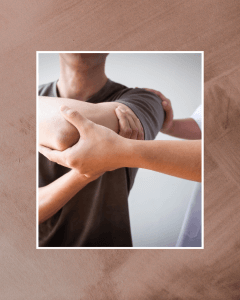
Rotator cuff tears are one of the most common causes of shoulder pain and weakness, especially among adults who stay active, play sports, or work in physically demanding jobs. If you’ve been diagnosed with a rotator cuff tear—or suspect you may have one—you’re likely dealing with discomfort, reduced mobility, and frustration with everyday activities. The good news is that physiotherapy can play a major role in your recovery.
What Is a Rotator Cuff Tear?
The rotator cuff is a group of four muscles and tendons that stabilize your shoulder and allow you to lift, rotate, and move your arm. A tear can happen gradually from wear and tear or suddenly from an injury, such as lifting something heavy or falling.
Common symptoms include:
-
Shoulder pain (especially when lifting or reaching overhead)
-
Weakness in the arm
-
Difficulty sleeping on the affected side
-
Limited range of motion
Rotator cuff tears can be partial (where only part of the tendon is damaged) or full-thickness (where the tendon is completely torn).
How Physiotherapy Helps Rotator Cuff Tears
Physiotherapy is often the first line of treatment for rotator cuff injuries, and many patients can avoid surgery with the right program. A physiotherapist will create a customized plan to restore shoulder function, reduce pain, and help you return to your daily activities safely.
Benefits of Physiotherapy for Rotator Cuff Tears:
-
Pain Relief – Gentle manual therapy techniques, soft tissue work, and modalities like ultrasound or laser therapy can reduce inflammation and discomfort.
-
Restoring Mobility – Targeted stretching helps improve flexibility in the shoulder joint and surrounding muscles.
-
Strengthening Exercises – A progressive strengthening program helps rebuild the rotator cuff and supporting muscles to stabilize your shoulder.
-
Posture & Movement Correction – Improving posture and movement patterns reduces strain on the shoulder, preventing further injury.
-
Return to Activity – Physiotherapy helps you gradually and safely return to work, sports, or hobbies without setbacks.
Do All Rotator Cuff Tears Need Surgery?
Not necessarily. Many partial tears respond very well to physiotherapy alone. Even with larger tears, physiotherapy is often recommended both before and after surgery to ensure the best outcomes.
When to See a Physiotherapist
If you are experiencing ongoing shoulder pain, difficulty lifting your arm, or weakness in your shoulder, booking an assessment with our physiotherapist is a smart first step. Early intervention can prevent the injury from worsening and speed up your recovery. Contact Laurelwood Chiropractic Wellness Centre | (519) 883-4188
